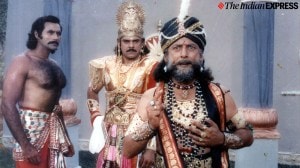Old warhorses slip on Bihar turf, trip Cong
‘‘Congress ka haath, walking stick ke saath.’’ The cutting remark from a cynical AICC functionary said it all. The blame...

‘‘Congress ka haath, walking stick ke saath.’’ The cutting remark from a cynical AICC functionary said it all. The blame game has begun in the Congress, with responsibility for the debacle in Bihar and Jharkhand being put on an old guard, out of touch with reality, that had overestimated the party’s ground-level strength.
While the jubilation at winning a massive majority in
Nothing illustrated this more than Jharkhand, where, even weeks ago, the incumbent BJP government seemed all set to lose. Now the BJP-headed alliance is within striking distance of a majority. The Congress, having partnered a declining JMM but alienated the RJD in the state, can only wonder what may have been.
The truth is the Congress forgot the political rules it had so carefully written for itself in 2004. If the Lok Sabha election was won because of carefully crafted alliances, the race for Patna and Ranchi saw no such effort.
The BJP managed to fight off anti-incumbency in Jharkhand because it tied up with the JD(U), which it had not done in the 2004 Lok Sabha polls. On the other hand, the Congress, which had an alliance with Laloo Yadav’s RJD in 2004 and won the equivalent of 61 out of 81 assembly seats, faltered this time. The anti-BJP vote got divided between the Congress-JMM and the Laloo-Left alliance.
At the Congress HQ, the knives are out for the two that did the strategising for Bihar and Jharkhand — Arjun Singh and Makhan Lal Fotedar. Some are even putting part of the blame on Ahmed Patel who coordinated with Laloo in Bihar. The knives had, in fact, begun to be sharpened after the exit polls indicated the Congress-JMM was not going to do as well as had once seemed inevitable.
The cardinal sin, as a senior Congress leader put it, was for the party not to talk to Laloo, its ally in Bihar, before deciding the seat-sharing arrangement in Jharkhand. The Singh-Fotedar strategy left no room for Laloo to negotiate. The Congress presented Laloo with a fait accompli: 33 seats for the Congress, 35 for the JMM, nine for the RJD, four for the Left.
The hardline attitude had its impact in neighbouring Bihar. ‘‘No talks could really take place with Laloo after the decision on Jharkhand,’’ said a senior Congress leader.
Had a compromise been worked out, the RJD chief might have upped his offer of 25 seats to the Congress in Bihar to about ‘‘30-35’’. At least this is what some in the Congress would now like to believe.
The alliance with Shibu Soren (JMM) proved costly for the Congress. As it turned out, the JMM vote got divided with the revolt by Stephen Marandi, and Soren’s two sons have both been defeated.
The upper caste/non-tribal vote, which had begun to veer to the Congress, went back to the BJP. It was alarmed at the idea of Soren as chief minister. Finally, to ensure the JMM had more seats than the Congress — in case of a battle for the chief ministry — Soren fielded rebels in some Congress seats. The presence of RJD nominees further divided the non-BJP vote. And the Congress now has the embarrassing task of going to Laloo if it has to explore the possibility of forming a government.
In Bihar, the Congress fell between two stools. It neither took on Laloo fully nor did it have the benefit of an alliance with him. For instance,, had it allied only with Ram Vilas Paswan, and the two had together contested all 243 seats—the Congress left 109 plum seats for Laloo—it might have done better.
As allegations and counter-allegations continued into the night, the Congress had to confront one looming message. Its grand plan to rein in Laloo in Bihar so as to make him more amenable in Delhi, and yet ensure a secular government in Patna in which it would play a pivotal role, had fallen flat. At the beginning of the Budget session of Parliament, that couldn’t be a comforting feeling for the ruling party.
If there was some consolation for the Congress, it was that it managed to divide the anti-Laloo vote, or the BJP-JD(U) might have come to power. Another source of solace, if it can be called so, is that the configuration of results can make Prime Minister Manmohan Singh breathe easy. Had the Congress done well in all three states, it would have had UPA allies pressing panic buttons. A resurgent Congress would have made them uncomfortable, and given an impetus to a Third Front type arrangement.
Even so, the elections show the Congress has not shed its old mindset. ‘‘That mindset was manifest in the way we negotiated with our allies,’’ remarked a party leader candidly. ‘‘We could have contained Laloo only if we had our own strength. You cannot do it on the strength of others. We are yet to realise we have to change with the times.’’





- 01
- 02
- 03
- 04
- 05


























